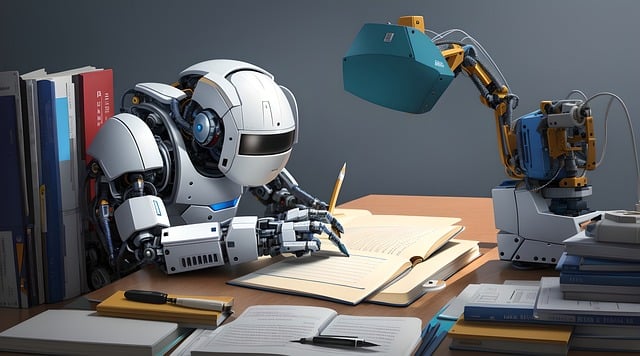In the ever-evolving world of entertainment, the emergence of Scriptwriting AI has brought both innovation and intrigue to the forefront of the screenwriting scene. This article explores how AI has reshaped scriptwriting, compares AI-generated scripts with those written by humans, and delves into the advantages and disadvantages of both approaches.
The Rise of Scriptwriting AI
The advent of Scriptwriting AI has ushered in a new era of creativity and efficiency in the world of storytelling. AI-powered tools and algorithms are now capable of generating scripts for various media, from films and television shows to advertisements and video games. Here's how Scriptwriting AI has made its mark:
Speed and Efficiency: AI can churn out scripts at an unprecedented pace, making it a valuable resource for tight production schedules.
Endless Inspiration: AI can analyze vast amounts of existing scripts and literature to generate fresh ideas and plotlines.
Consistency: AI can maintain a consistent tone, style, and character development throughout a script.
Adaptability: AI can be programmed to cater to different genres, languages, and styles.
Also Read
· Scriptwriting VS Screenwriting
· Scriptwriting Jobs: How to make $500+ As a Scriptwriter on Heuristic Heights
Collaboration: AI can work alongside human writers, assisting in various aspects of the creative process.
AI vs. Human Scriptwriters: Advantages and Disadvantages
Advantages of Scriptwriting AI:
Speed and Efficiency: AI can produce scripts in a fraction of the time it would take a human writer, making it ideal for projects with tight deadlines.
Data-Driven Creativity: AI can analyze extensive data to generate scripts that align with popular trends and audience preferences.
Consistency: AI can maintain a consistent tone and style throughout a script, reducing the risk of plot holes or inconsistencies.
Exploration of Ideas: AI can offer fresh perspectives and generate ideas that human writers may not have considered.
Cost-Effective: AI can potentially reduce production costs by minimizing the need for extensive human scriptwriting.
Disadvantages of Scriptwriting AI:
Lack of Originality: While AI can generate scripts, it may struggle with creating truly original and groundbreaking narratives.
Emotional Depth: AI often struggles to infuse scripts with genuine human emotion and depth, leading to stories that may feel sterile or formulaic.
Limited Creativity: AI's creativity is confined to existing data, potentially stifling innovation and risking formulaic storytelling.
Ethical Concerns: The use of AI in scriptwriting raises ethical questions, such as copyright issues and the potential displacement of human writers.
Human Touch: Scripts written by AI may lack the unique voice, perspective, and humanity that human writers bring to their work.
Human Scriptwriters: Advantages and Disadvantages
Advantages of Human Scriptwriters:
Creativity and Originality: Human writers possess the capacity for boundless creativity, allowing them to craft truly original and innovative narratives.
Emotional Depth: Human writers can infuse scripts with genuine human emotion, creating characters and stories that resonate deeply with audiences.
Unique Perspectives: Human writers bring their unique voices, experiences, and perspectives to their work, offering fresh and diverse storytelling.
Adaptability: Human writers can pivot and adapt their writing to suit various genres, tones, and styles.
Artistry: The craft of scriptwriting is an art form, and human writers often strive to create works of art that transcend mere storytelling.
Disadvantages of Human Scriptwriters:
Time-Consuming: Human scriptwriting can be time-intensive, potentially delaying production schedules.
Subjectivity: Human writers are influenced by personal biases and preferences, which may not always align with audience tastes.
Inconsistency: Human writers may struggle with maintaining consistent tone and style throughout a script.
Limited Data Analysis: Human writers may lack the data-driven insights that AI can provide to align with market trends.
Resource-Intensive: Hiring human scriptwriters can be costly, especially for large-scale productions.
Conclusion: Balancing the Art and Algorithm
The rise of Scriptwriting AI has undeniably transformed the landscape of scriptwriting, offering unprecedented speed, efficiency, and data-driven insights. However, it comes with its own set of challenges, including a potential lack of originality and emotional depth. Human scriptwriters, on the other hand, bring the irreplaceable qualities of creativity, artistry, and the human touch to their work, yet they may face limitations in terms of speed and efficiency.
The future of scriptwriting likely lies in a harmonious marriage of AI and human creativity. AI can serve as a valuable tool for generating ideas, enhancing efficiency, and aiding in data analysis, while human writers can infuse scripts with authenticity, originality, and emotional resonance. Collaboration between AI and human scriptwriters may well lead to the creation of stories that are not only technically proficient but also deeply moving and artistically profound.
In this evolving landscape, the role of the scriptwriter is expanding to include not just writing but also the thoughtful integration of AI into the creative process. Whether it's the whirring gears of AI algorithms or the imaginative minds of human writers, the future of scriptwriting is a captivating interplay between art and algorithm, producing narratives that continue to captivate and inspire audiences worldwide.

